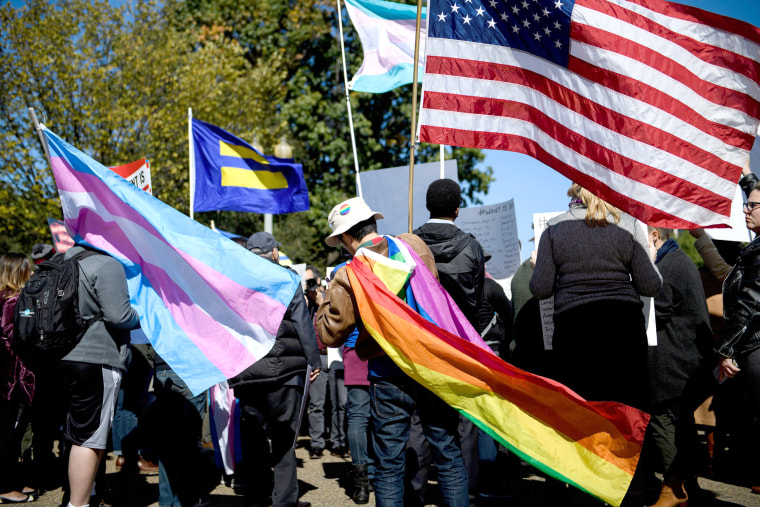Just a three weeks into 2019, five states have expanded the rights of their lesbian, gay, bisexual, transgender and queer residents.
“Anti-LGBTQ lawmakers all over the country, who were some of the most vocal opponents, lost their seats,” Kasey Suffredini, president of strategy at LGBTQ rights group Freedom for All Americans, told NBC News. “That has sent a signal to lawmakers that the pubic is increasingly supportive of LGBTQ people.”

Four of the 20 new governors who took office this month, three Democrats and one Republican, signed nondiscrimination orders that include sexual orientation and gender identity.
Wisconsin Gov. Tony Evers, a Democrat, signed an executive order on Jan. 7, his first day in office, requiring state agencies to develop and implement policies preventing discrimination against employees based on their sexual orientation and gender identity.
Megin McDonell, executive director of LGBTQ group Fair Wisconsin, praised the move, saying it “modernizes our state’s internal policies to make sure Wisconsin government employees are judged solely on their job performance, not who they are or who they love.”
This week, Ohio Gov. Mike DeWine, a Republican, followed suit. On Monday, his first day in office, he signed an executive order prohibiting discrimination against LGBTQ state workers. His predecessor, John Kasich, became the first Republican governor in a state without an LGBTQ nondiscrimination law to issue an executive order extending employment protections on the basis of sexual orientation and gender identity.
“Governor DeWine made a strong statement on his first day that he will be a Governor for all Ohioans,” Equality Ohio Executive Director Alana Jochum said in a statement. “Ohio is still playing catch-up when it comes to welcoming LGBTQ people — and we are grateful that Governor DeWine, like Governor Kasich before him, recognizes the need for these common-sense protections in Ohio.”
Also on Monday, Michigan Gov. Gretchen Whitmer signed a new directive prohibiting LGBTQ-based discrimination in state services or by state contractors, replacing a narrower order that her Republican predecessor, Rick Snyder, signed days before he left office.
"If we're going to attract the talented workforce our businesses need to create jobs and grow our economy, then we've got to get on the right side of history," Whitmer said in a statement.
Then on Tuesday, in her first official act as Kansas governor, Democrat Laura Kelly signed a similar order that protects LGBTQ state employees and contractors from discrimination and prohibits discrimination in state services on the basis of sexual orientation. The order reinstates protections that were rescinded by Kelly’s predecessor, Sam Brownback, who is now U.S. Ambassador at Large for International Religious Freedom.
"In a perfect world, we wouldn't need executive orders like this," Kelly told reporters during a Statehouse news conference. "It's important that, until we become a perfect world, that we make sure that we've got the kinds of things in place that move it towards perfection."
Kelly’s order drew praise from former Kansas Gov. Kathleen Sebelius, a Democrat who served as health secretary in the Obama administration.
“Governor Kelly's order is the right thing to do for Kansas, and a step toward ensuring our state is well-positioned to attract and maintain businesses that strengthen our economy, our communities and our families,” Sebelius said.
Florida’s new governor, Ron DeSantis, a Republican, bucked the trend. He garnered national attention for leaving LGBTQ people out of an executive order. DeSantis’ “Reaffirming Commitment to Diversity in Government” order prohibits workplace discrimination based on “age, sex, race, color, religion, national origin, marital status or disability.”
Wisconsin, Ohio, Michigan, Kansas and Florida are among 29 states that do not have explicit laws banning employment discrimination based on both sexual orientation and gender identity, according to the LGBTQ think tank Movement Advancement Project.
The New York State Legislature voted Tuesday to ban so-called gay conversion therapy on minors. The measure will make New York the 15th state to ban the contentious practice, which is widely discredited by medical and mental health organizations. On the same day, New York passed the Gender Expression Non-Discrimination Act (GENDA), which will add gender identity to the state’s human rights and hate crime laws.
The bills — which now heads to Gov. Andrew Cuomo, a Democrat, to be signed — are both part of the state’s larger LGBTQ-rights push, which was announced by Cuomo last year. On the agenda is also a bill that seeks to prohibit the so-called gay panic defense.
In New Jersey, transgender people will gain new rights this year under two laws signed last year by Gov. Phil Murphy, a Democrat. One, which goes into effect next month, makes it easier for trans people to change the gender on their birth certificate, and the other, which goes into effect in July, permits a person’s chosen gender identity to be reflected on their death certificate.
LOOKING AHEAD
These bills and executive orders are just some of the developments LGBTQ and civil rights advocates are watching in 2019.
Reg Calcagno, a state advocacy strategist with the ACLU’s Trans Justice campaign, said there's "a lot happening at the state level that may actually indicate some positive movement."
New Mexico joined a growing number of states that have introduced legislation to ban gay and transgender panic defenses. In Virginia, nondiscrimination legislation, which enjoys bipartisan support, may come up for a vote in the House of Delegates this year. Freedom for All Americans is also watching the Ohio Fairness Act and the Florida Competitive Workforce Act, bills that would provide LGBTQ people nondiscrimination protections in employment, housing and public accommodation in each state.
Though Suffredini and Calcagno both expect to see some anti-LGBTQ bills this session in Georgia and Texas, neither one expects as many as in previous years. “We are seeing signals we might not see that kind of a fight,” Suffredini said.
However, bills specifically targeting transgender youth are not going away, Calcagno said. In South Dakota this week, the State Senate introduced Bill 49, which would affect transgender athletes’ ability to participate in high school sports. For the purpose of gender-segregated school sports, the Republican bill states that “the sole determinant of a student's sexual identity is the sexual identity noted on the student's certificate of birth.”
Suffredini reiterated the importance of LGBTQ gains in the states, as advocates anticipate continued obstacles at the federal level.
“In this climate, where the federal administration is one of the most hostile LGBTQ community has faced in recent memory, it has really made it clear to the people who love and support us that state protections are the last line of defense.”


